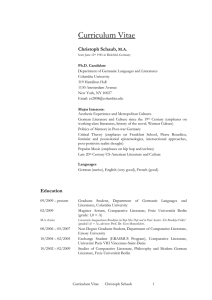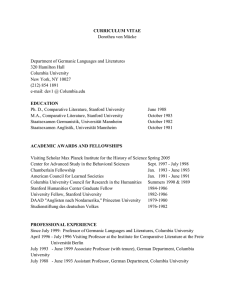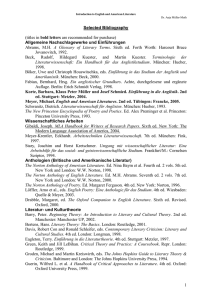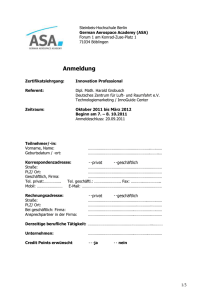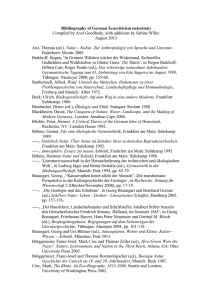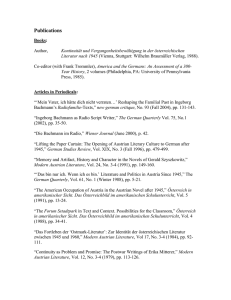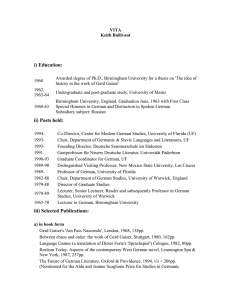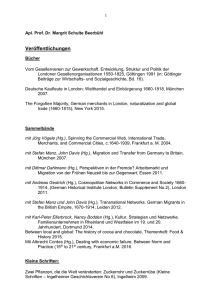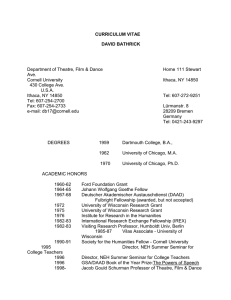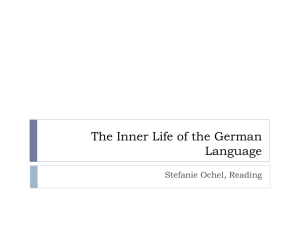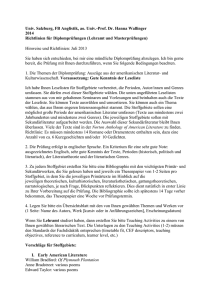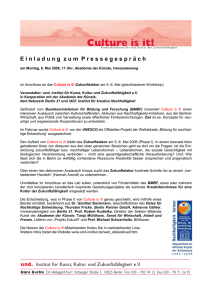Course Bibliography - the University of Warwick
Werbung
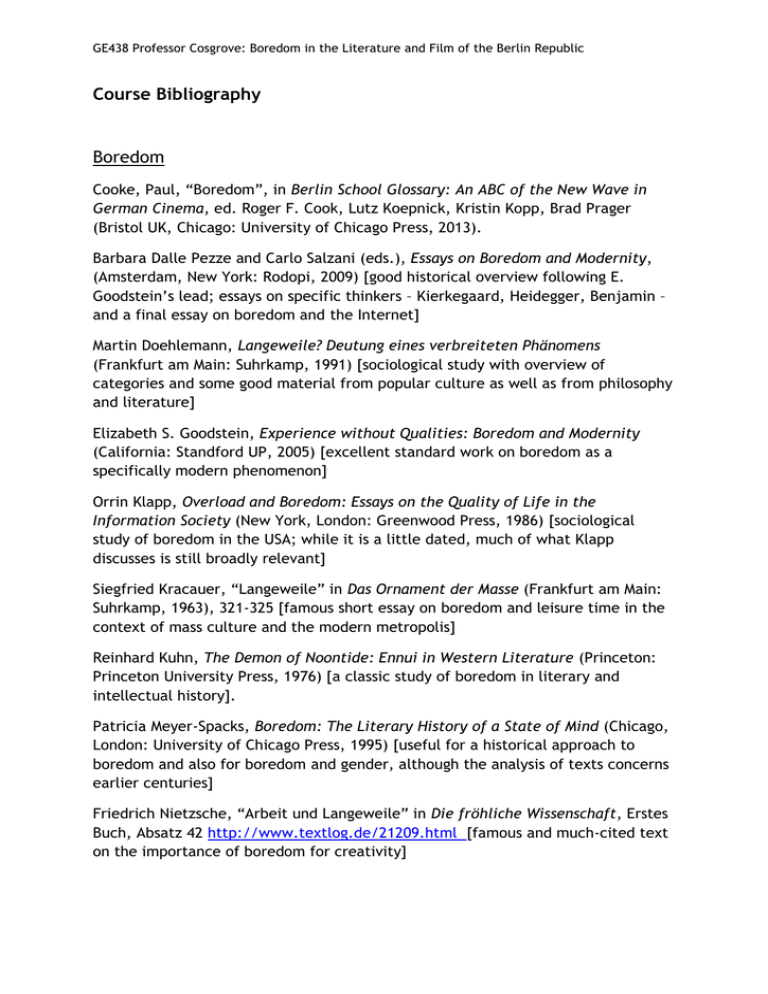
GE438 Professor Cosgrove: Boredom in the Literature and Film of the Berlin Republic Course Bibliography Boredom Cooke, Paul, “Boredom”, in Berlin School Glossary: An ABC of the New Wave in German Cinema, ed. Roger F. Cook, Lutz Koepnick, Kristin Kopp, Brad Prager (Bristol UK, Chicago: University of Chicago Press, 2013). Barbara Dalle Pezze and Carlo Salzani (eds.), Essays on Boredom and Modernity, (Amsterdam, New York: Rodopi, 2009) [good historical overview following E. Goodstein’s lead; essays on specific thinkers – Kierkegaard, Heidegger, Benjamin – and a final essay on boredom and the Internet] Martin Doehlemann, Langeweile? Deutung eines verbreiteten Phänomens (Frankfurt am Main: Suhrkamp, 1991) [sociological study with overview of categories and some good material from popular culture as well as from philosophy and literature] Elizabeth S. Goodstein, Experience without Qualities: Boredom and Modernity (California: Standford UP, 2005) [excellent standard work on boredom as a specifically modern phenomenon] Orrin Klapp, Overload and Boredom: Essays on the Quality of Life in the Information Society (New York, London: Greenwood Press, 1986) [sociological study of boredom in the USA; while it is a little dated, much of what Klapp discusses is still broadly relevant] Siegfried Kracauer, “Langeweile” in Das Ornament der Masse (Frankfurt am Main: Suhrkamp, 1963), 321-325 [famous short essay on boredom and leisure time in the context of mass culture and the modern metropolis] Reinhard Kuhn, The Demon of Noontide: Ennui in Western Literature (Princeton: Princeton University Press, 1976) [a classic study of boredom in literary and intellectual history]. Patricia Meyer-Spacks, Boredom: The Literary History of a State of Mind (Chicago, London: University of Chicago Press, 1995) [useful for a historical approach to boredom and also for boredom and gender, although the analysis of texts concerns earlier centuries] Friedrich Nietzsche, “Arbeit und Langeweile” in Die fröhliche Wissenschaft, Erstes Buch, Absatz 42 http://www.textlog.de/21209.html [famous and much-cited text on the importance of boredom for creativity] GE438 Professor Cosgrove: Boredom in the Literature and Film of the Berlin Republic Michael L. Raposa, Boredom and the Religious Imagination (Charlottesville, VA, London: University Press of Virginia, 1999) [chapter 2 is useful for an overview of acedia] Lars Svendsen, A Philosophy of Boredom, trans. John Irons (London: Reaktion, 2005) [excellent general introduction to the theme from a cultural – filmic and literary – historical as well as a philosophical angle] Peter Toohey, Boredom: A Lively History (New Haven, London: Yale UP, 2011) [excellent general introduction, with chapters on boredom and animals, acedia and chronic boredom] Ludwig Völker, Langeweile: Untersuchungen zur Vorgeschichte eines literarischen Motivs (Munich: Fink, 1975) [authoritative study of the history of the term “Langeweile”] Richard Winter, Still Bored in a Culture of Entertainment: Rediscovering Passion and Wonder (Illinois: Intervarsity Press, 2002) [easily readable general essay on boredom in the contemporary era] Other reading Marco Abel, The Counter-Cinema of the Berlin School (Rochester, NY: Camden House, 2013) Marc Augé, Non-Places: An Introduction to Supermodernity, trans. John Howe (London, New York: Verso, 1995) Jean Baudrillard, The Consumer Society: Myths and Structures, trans. Chris Turner (London: Sage, 1998) Anke S. Biendarra, Germans going Global: Contemporary Literature and Cultural Globalization (Berlin: De Gruyter, 2012) Ulrich Bröckling, Das unternehmerische Selbst: Soziologie einer Subjektivierungsform (Frankfurt am Main: Suhrkamp, 2013) Hubert L. Dreyfus, On the Internet (London: Routledge, 2008) Alain Ehrenberg, The Wearniness of the Self: Diagnosing the History of Depression in the Contemporary Age (Montreal-Kingston, London: McGill-Queen’s UP, 2010) David Frisby, Fragments of Modernity: Theories of Modernity in the Work of Simmel, Kracauer and Benjamin (Cambridge: Polity, 1985) GE438 Professor Cosgrove: Boredom in the Literature and Film of the Berlin Republic Roger Keil and Klaus Ronneberger, “The Globalization of Frankfurt am Main: Core Periphery and Social Conflict”, in Globalizing Cities: A New Spatial Order, eds. Peter Marcuse, Ronald Van Kempen (Oxford: Blackwell, 2000), pp. 228-248 Ute Lehrer, “Willing the Global City: Berlin’s Cultural Strategies of Inter-Urban Competition after 1989”, in The Global Cities Reader, ed. Neil Brenner, Roger Keil (Oxford, New York: Routledge, 2006), pp. 332-338 Peter Merriman, “Driving Places: Marc Augé, Non-Places and the Geographies of England’s M1 Motorway”, Theory, Culture & Society 21:4-5 (2004): 145-167 Saskia Sassen, “The Global City: The De-Nationalizing of Time and Space” http://90.146.8.18/en/archiv_files/20021/E2002_018.pdf Richard Sennett, The Corrosion of Character: The Personal Consequences of Work in the New Capitalism (New York, London: Norton, 1998) Georg Simmel, “Die Groβstädte und das Geistesleben”, Projekt Gutenberg-De.: http://gutenberg.spiegel.de/buch/die-grossstadte-und-das-geistesleben-7738/2 John Tomlinson, The Culture of Speed: The Coming of Immediacy (London: Sage, 2007) Recommended reading on individual writers / works / films Wilhelm Genazino Anne Fuchs, “After the Flâneur: Temporality and Connectivity in Wilhelm Genazino’s Belebung der Toten Winkel and Das Glück in Glücksfernen Zeiten” Modern Language Review 109:2 (2014): 431-446 Wilhelm Genazino, “Der Untrost und die Untröstlichkeit der Literatur”, in Der gedehnte Blick (Munich: DTV, 2007), 196-205 Wilhelm Genazino, “Der Ernstfall der Langeweile”, in Idyllen in der Halbnatur (Munich: DTV, 2012), 222-26 Françoise Wemelsfelder, “Animal Boredom: Understanding the Tedium of Confined Lives”, in Mental Health and Well-Being in Animals, ed. Franklin D. McMillan (Oxford: Blackwell, 2005), 79-91. Iris Hanika Matthew Cook, Micheline van Riemsdijk, “Agents of memorialization: Gunter Demnig's Stolpersteine and the individual (re-)creation of a Holocaust landscape in GE438 Professor Cosgrove: Boredom in the Literature and Film of the Berlin Republic Berlin”, Journal of Historical Geography 43 (2014): 138-147 http://www.sciencedirect.com/science/article/pii/S0305748813000996 Mary Cosgrove, Born under Auschwitz: Melancholy Traditions in Postwar German Literature (Rochester, NY: Camden House, 2014), epilogue “Death of the Male Melancholy Genius: From Vergangenheitsbewältigung to Vergangenheitsbewirtschaftung in Iris Hanika’s Das Eigentliche, pp. 185-xx Andrew S. Gross, “Holocaust Tourism in Berlin: Global Memory, Trauma and the Negative Sublime”, Journeys 7:2 (year): 73-100 http://courses.washington.edu/berlin07/Readings/AndyGross_HolocaustTourismIn Berlin.pdf Griselda Pollock, “Holocaust Tourism: Being there, looking back and the ethics of spatial memory”, in Visual Culture and Tourism, ed. David Crouch, Nina Lübbren (Oxford: Berg, 2003), pp. 175-190 Bill Niven, Facing the Nazi Past: United German and the Legacy of the Third Reich (London: Routledge, 2001), chapter 1 “Concentration camp memorial sites”, pp. 938; chapter 8 “The Holocaust memorial”, pp. 189-226 Erhard Schütz, “Über das literarische Rückkehrrecht der Erinnerung. Eine mögliche Perspektive auf Europa in der deutschen Gedächtniskultur” http://www.kas.de/upload/Publikationen/2014/bruecken_bauen_in_europa/1401 20_schuetz.pdf. Erhard Schütz, “Zweitgeschichte? Gegenwartsliteratur zwischen Vergangenheitsbewirtschaftung und Geschichtsermunterung”, Zeitschrift für Germanistik 23:3 (2013): 592-606. Henryk M. von Broder, “Das Shoah Business” Der Spiegel (16) 4 April 1993 http://www.spiegel.de/spiegel/print/d-13680385.html Terezia Mora Tobias Kraft, “Von einer Poetik der Drastik zum Entwurf eines 'Realismus der Globalisierung' am Beispiel der Romane von Terézia Mora”, Pandaemonium Germanicum: Revista de Estudos Germanísticos 20 (2012): 154-175 [focuses more on earlier novel Alle Tage than on Der einzige Mann auf dem Kontinent] Monika Shafi, “ ‘Mit der Wende kam der Appetit’: Food, Work, and Gender in Terézia Mora’s novel Der einzige Mann auf dem Kontinent”, Chloe: Beihefte zum Daphnis, “ […] wenn sie das Wort Ich gebraucht”, Festschrift für Barbara BeckerCantarino, ed. Jacqueline Vasant and John Pustejovsky, 47 (2013): 307-324 GE438 Professor Cosgrove: Boredom in the Literature and Film of the Berlin Republic Nathan Taylor, “Am Nullpunkt des Realismus: Terézia Moras Poetik des Hic et Nunc”, in Poetiken der Gegenwart: Deutschsprachige Romane nach 2000, ed. Silke Horstkotte, Leonhard Herrmann (Berlin: De Gruyter, 2013), pp. 13-30 [focuses more on earlier novel Alle Tage than on Der einzige Mann auf dem Kontinent] Julia Schoch Mary Cosgrove “Heimat as Nonplace and Terrain Vague in Jenny Erpenbeck’s Heimsuchung and Julia Schoch’s Mit der Geschwindigkeit des Sommers”, New German Critique 39:2 116 (2012): 63-86 Anne Fuchs, “Ostalgia, Local Identity and the Quest for Heimat in the Global Age: Julia Schoch’s Mit der Geschwindigkeit des Sommers and Judith Zander’s Dinge, die wir heute sagten”, in Heimat: At the Intersection of Space and Memory, ed. Friederike Eigler, Jens Kugele (Berlin: De Gruyter, 2012), pp. 125-139 Emily Jeremiah, “Shameful Stories: The Ethics of East German Memory Contests in Fiction by Julia Schoch, Stefan Moster, Ante Rávic Strubel, and Judith Schalansky”, in Edinburgh German Yearbook 7: Ethical Approaches in Contemporary GermanLanguage Literature and Culture, ed. Frauke Matthes, Emily Jeremiah (Rochester, NY: Camden House 2013), pp. 65-83 Franziska Meyer, “The Past is Another Country and the Country is Another Past: Sadness in East German Texts by Jakob Hein and Julia Schoch, in Edinburgh German Yearbook 6: Sadness and Melancholy in German-Language Literature and Culture, ed. Mary Cosgrove, Anna Richards (Rochester, NY: Camden House, 2012), pp. 173-192 Christian Petzold: Yella Marco Abel, “The Cinema of Identification Gets on my Nerves: An Interview with Christian Petzold” Cineaste http://www.cineaste.com/articles/an-interview-withchristian-petzold.htm Marco Abel, The Counter-Cinema of the Berlin School (Rochester, NY: Camden House, 2013), chapter 2, pp. 69-110 Anke S. Biendarra, “Ghostly Business: Place, Space, and Gender in Christian Petzold’s Yella” Seminar 47:3 (2011): 357-370 Jaimey Fisher, “Globalization as Uneven Geographical Development: The ‘Creative’ Destruction of Place and Fantasy in Christian Petzold’s Ghost Trilogy”, Seminar 47:4 (2011): 447-464 Matthew D. Miller, “Facts of Migration, Demands on Identity: Christian Petzold's Yella and Jerichow in Comparison", The German Quarterly (Winter 2012): 55-76 GE438 Professor Cosgrove: Boredom in the Literature and Film of the Berlin Republic Brad Prager, “Passing Time Since the Wende: Recent German Film on Unification”, German Politics and Society Issue 94 28:1 (Spring 2010): 95-110 Christoph Hochhäusler: Unter dir die Stadt Marco Abel, The Counter-Cinema of the Berlin School (Rochester, NY: Camden House, 2013), chapter 5, pp. 162-200 http://www.filmgazette.de/?s=filmkritiken&id=547 http://www.critic.de/special/amour-fou-eines-managers-3145/ http://www.spiegel.de/kultur/kino/banker-film-unter-dir-die-stadt-mein-freundist-ein-high-potential-a-754100.html http://www.schnitt.de/223,6549,01.html
